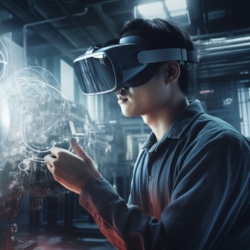December 6, 2023
There will be a near universal adoption of generative AI in businesses, say bosses
by Neil Franklin • AI, News, Technology
 An overwhelming majority (91 percent) of executives say that their companies are now using generative AI or are planning to do so within the next 18 months, according to a new poll from Thomson Reuters. The Thomson Reuters Future of Professionals C-Suite Survey reported on responses from 148 C-Suite leaders (CFOs, CEOs etc) from the United States, United Kingdom and Canada. The survey suggests that use of AI across businesses is becoming ubiquitous as leaders start to recognize the true potential of the technology, such as in developing new products and driving operational efficiency. (more…)
An overwhelming majority (91 percent) of executives say that their companies are now using generative AI or are planning to do so within the next 18 months, according to a new poll from Thomson Reuters. The Thomson Reuters Future of Professionals C-Suite Survey reported on responses from 148 C-Suite leaders (CFOs, CEOs etc) from the United States, United Kingdom and Canada. The survey suggests that use of AI across businesses is becoming ubiquitous as leaders start to recognize the true potential of the technology, such as in developing new products and driving operational efficiency. (more…)
December 5, 2023
People are worried about the impact of new tech, but many feel confident it will benefit them
by Jayne Smith • AI, News, Technology
 With over a third (36 percent) of workers concerned about the impact of technological changes and what this might mean for them, a new report from Virgin Media O2 Business claims that many people believe new tech will offer them a better work-life balance. According to the report, the pandemic accelerated remote and hybrid work, mostly benefitting desk-based workers. Meanwhile, deskless workers like teachers, nurses and engineers saw limited long-term change despite many organisations comprising both types of workers. (more…)
With over a third (36 percent) of workers concerned about the impact of technological changes and what this might mean for them, a new report from Virgin Media O2 Business claims that many people believe new tech will offer them a better work-life balance. According to the report, the pandemic accelerated remote and hybrid work, mostly benefitting desk-based workers. Meanwhile, deskless workers like teachers, nurses and engineers saw limited long-term change despite many organisations comprising both types of workers. (more…)
December 5, 2023
Firms on both sides of the pond are sluggish in uptake of generative AI
by Neil Franklin • AI, News, Technology
 One year on from the launch of Chat GPT, new data from Slack based on 10,000 global workers (including 1,000 the UK) suggests that UK companies believe there is much greater urgency to adopt Generative AI at work than US companies – yet uptake remains sluggish in both markets. According to the study, 61 percent of UK workers believe there is a high or existential need to incorporate Generative AI into work compared to just 44 percent of US workers who feel the same. (more…)
One year on from the launch of Chat GPT, new data from Slack based on 10,000 global workers (including 1,000 the UK) suggests that UK companies believe there is much greater urgency to adopt Generative AI at work than US companies – yet uptake remains sluggish in both markets. According to the study, 61 percent of UK workers believe there is a high or existential need to incorporate Generative AI into work compared to just 44 percent of US workers who feel the same. (more…)
November 30, 2023
Generative AI will hollow out many middle class roles over the next decade
by Neil Franklin • AI, News, Technology, Workplace
 Generative AI will have a much greater impact on white collar roles than blue collar ones over the next 10 years, according to a new report from Pearson. In at least ten white collar roles, more than 35 percent of tasks could be done by AI, with medical secretaries (41 percent) predicted to be the most impacted. Conversely, every of one of the top 10 least impacted are classed as blue collar, revealing launderers, dry cleaners and pressers (0 percent) as the UK’s most AI-proof job. (more…)
Generative AI will have a much greater impact on white collar roles than blue collar ones over the next 10 years, according to a new report from Pearson. In at least ten white collar roles, more than 35 percent of tasks could be done by AI, with medical secretaries (41 percent) predicted to be the most impacted. Conversely, every of one of the top 10 least impacted are classed as blue collar, revealing launderers, dry cleaners and pressers (0 percent) as the UK’s most AI-proof job. (more…)
November 29, 2023
People are more likely to accept advice from an AI animal, if the idea fits the species
by Neil Franklin • AI, News, Technology
 People are more accepting of advice from an AI in animal form if the idea seems to them to fit the species, such as running advice from a whippet, according to new research from UCD Michael Smurfit Graduate Business School (UCD Smurfit School), HEC Montréal, and Nottingham University Business School China (NUBS China). Consumers are then more likely to engage with the animal AI than humanoid AI if the activity, experience, or product is designed to be fun. The findings were first published in the journal Psychology & Marketing. (more…)
People are more accepting of advice from an AI in animal form if the idea seems to them to fit the species, such as running advice from a whippet, according to new research from UCD Michael Smurfit Graduate Business School (UCD Smurfit School), HEC Montréal, and Nottingham University Business School China (NUBS China). Consumers are then more likely to engage with the animal AI than humanoid AI if the activity, experience, or product is designed to be fun. The findings were first published in the journal Psychology & Marketing. (more…)
November 29, 2023
One year on from generative AI hype, people are scared and excited about its use
by Jayne Smith • AI, News, Technology
 Nearly one year after ChatGPT burst into the public consciousness, generative AI (GenAI) has left employees and their organisations both excited and uneasy. According to a recent study [registration] commissioned by Betterworks and conducted by Propeller Insights, over half of employees are using GenAI at work for complex activities and believe it has the potential to reduce bias across a swath of HR processes, despite the fact that only 41 percent of organisations are actively evaluating it or have made GenAI a priority. At the same time, many employees are concerned about the potential impact of GenAI on both their roles and the possibility of unintentional amplification of bias. (more…)
Nearly one year after ChatGPT burst into the public consciousness, generative AI (GenAI) has left employees and their organisations both excited and uneasy. According to a recent study [registration] commissioned by Betterworks and conducted by Propeller Insights, over half of employees are using GenAI at work for complex activities and believe it has the potential to reduce bias across a swath of HR processes, despite the fact that only 41 percent of organisations are actively evaluating it or have made GenAI a priority. At the same time, many employees are concerned about the potential impact of GenAI on both their roles and the possibility of unintentional amplification of bias. (more…)
November 21, 2023
Most business leaders think generative AI will be a boon for employees
by Neil Franklin • AI, News, Technology, Workplace
 Four out of five (81 percent) business leaders in the UK say Generative AI will benefit their employees, according to new research from LinkedIn. The top ways that UK executives believe Generative AI will benefit employees is by removing boring, repetitive tasks (64 percent), increasing productivity (52 percent) and freeing up time for bigger and more creative thinking (59 percent), according to the poll. One in three (31 percent) also believe that the rise of Generative AI will create brand new roles at their organisation. (more…)
Four out of five (81 percent) business leaders in the UK say Generative AI will benefit their employees, according to new research from LinkedIn. The top ways that UK executives believe Generative AI will benefit employees is by removing boring, repetitive tasks (64 percent), increasing productivity (52 percent) and freeing up time for bigger and more creative thinking (59 percent), according to the poll. One in three (31 percent) also believe that the rise of Generative AI will create brand new roles at their organisation. (more…)
November 7, 2023
The Workplace Cocktail Hour. Chris Moriarty on AI, toxic workplaces and more
by Mark Eltringham • AI, News, Podcasts, Technology, Workplace, Workplace Cocktail Hour
 In the first of a new series of news-based podcasts, I catch up with Chris Moriarty, the co-founder of Audiem and much besides. Over a glass of gin and tonic, we discuss the AI Safety Summit and the proclamations of imminent doom that came before and after it. We also talk about the covid inquiry and the toxic workplace culture it exposed as an intriguing subplot. (more…)
In the first of a new series of news-based podcasts, I catch up with Chris Moriarty, the co-founder of Audiem and much besides. Over a glass of gin and tonic, we discuss the AI Safety Summit and the proclamations of imminent doom that came before and after it. We also talk about the covid inquiry and the toxic workplace culture it exposed as an intriguing subplot. (more…)
November 2, 2023
Third of firms have adopted AI to replace or augment employees’ roles this year
by Neil Franklin • AI, News, Technology
 According to Owl Labs’ annual State of Hybrid Work Report, 32 percent of employees believe that AI will help them do their jobs more efficiently, while a further 22 percent think AI will create new jobs allowing their teams to grow. However, uncertainty around AI regulation and safety is causing ‘AI anxiety’ to grow, with nearly 1 in 5 UK workers (17 percent) concerned that AI will steal their jobs. A further 19 percent are worried that AI has the potential to create new ethical issues in the workplace. (more…)
According to Owl Labs’ annual State of Hybrid Work Report, 32 percent of employees believe that AI will help them do their jobs more efficiently, while a further 22 percent think AI will create new jobs allowing their teams to grow. However, uncertainty around AI regulation and safety is causing ‘AI anxiety’ to grow, with nearly 1 in 5 UK workers (17 percent) concerned that AI will steal their jobs. A further 19 percent are worried that AI has the potential to create new ethical issues in the workplace. (more…)
October 30, 2023
Firms are throwing resources at AI knowing they are likely to fail
by Neil Franklin • AI, News, Technology
 Despite a recent track record of failure when implementing digital strategies, more than three quarters of UK businesses are gearing up to invest in artificial intelligence over the next 12 months without really knowing what they are doing. Nearly three-quarters (73 percent) admit to being ill-prepared for the integration of the technology into their operations, according to new survey. The report [registration] from tech consultancy Infinum suggests that over two-thirds of UK businesses that invested in digital products over the past five years have faced failure and are about to invest in AI knowing of their own poor track record. (more…)
Despite a recent track record of failure when implementing digital strategies, more than three quarters of UK businesses are gearing up to invest in artificial intelligence over the next 12 months without really knowing what they are doing. Nearly three-quarters (73 percent) admit to being ill-prepared for the integration of the technology into their operations, according to new survey. The report [registration] from tech consultancy Infinum suggests that over two-thirds of UK businesses that invested in digital products over the past five years have faced failure and are about to invest in AI knowing of their own poor track record. (more…)
October 19, 2023
Real estate tech strategies advance AI, workplace and sustainability
by Jayne Smith • AI, News, Property, Technology
 Commercial real estate occupiers are willing to put their money where the tech is, according to new polling from JLL’s 2023 Global Real Estate Technology Survey. Ninety-one percent of occupier respondents are willing to pay a premium for tech-enabled space as they look to technology for strategic value and increased revenue. In fact, real estate tech budgets are set to grow faster than investments in?headcount, footprint and operating budgets, the report suggests. (more…)
Commercial real estate occupiers are willing to put their money where the tech is, according to new polling from JLL’s 2023 Global Real Estate Technology Survey. Ninety-one percent of occupier respondents are willing to pay a premium for tech-enabled space as they look to technology for strategic value and increased revenue. In fact, real estate tech budgets are set to grow faster than investments in?headcount, footprint and operating budgets, the report suggests. (more…)
October 10, 2023
Employers struggling to keep pace with AI adoption
by Neil Franklin • AI, News, Technology
 While the use of AI tools in the workplace is rapidly increasing, many organisations are lagging in providing guidance and training in the use of these technologies, according to new survey commissioned by Ricoh Europe. This governance gap comes amidst growing interest within companies to implement automation solutions. The poll of 6,000 workers across Europe, conducted by Opinium, suggests there is a gap between workers’ use of emerging technologies and organisations’ efforts to support and manage that usage. (more…)
While the use of AI tools in the workplace is rapidly increasing, many organisations are lagging in providing guidance and training in the use of these technologies, according to new survey commissioned by Ricoh Europe. This governance gap comes amidst growing interest within companies to implement automation solutions. The poll of 6,000 workers across Europe, conducted by Opinium, suggests there is a gap between workers’ use of emerging technologies and organisations’ efforts to support and manage that usage. (more…)














